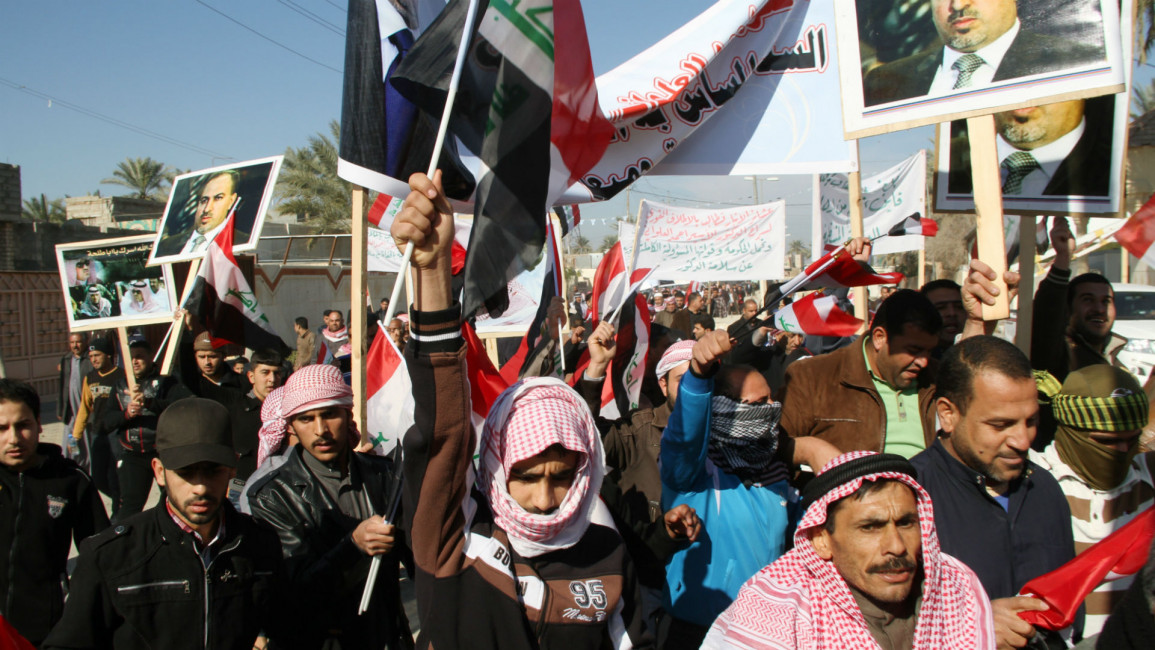
Iraq: The chronicle of a crime foretold
What we now see in Iraq is the outcome of a systematic process to destroy the country - a process which started with the US-led military occupation and the subsequent destruction of the state’s foundations and the imposition of an authoritarian sectarian regime. It is also the result of ongoing criminal acts perpetrated by regional powers aimed at preventing Iraq’s eventual resurgence.
It is understandable that people have rejected oppression and tyranny under the sectarian regime. Furthermore, the fear of sectarianism prevailing - especially given the ascendency of the Islamic State of Iraq and Syria (known in the region by its Arabic acronym, Daish), creates the threat of sectarian war and the permanent division of Iraq.
It is not strange that we see signs of sectarianism colouring political movements in Iraq. The dominance of a sectarian system, especially one that uses bombing and torture against its enemies, will inevitably produce an opposition with its own sectarian overtones. And the stirring up of sectarian fears overshadows any other struggle for national or social rights – or for liberation. This undermining of a collective popular struggle was surely the objective from the start.
That the Americans imposed a constitution of sectarian quotas stymying efforts towards national unity was no accident. It was a policy that made all parties look at the country’s natural resources not as national wealth but rather as something to be shared out along regional, sectarian and ethnic lines. It paved the way for the division of spoils, and the division of the country itself.
The spoils of war
But if Iraqis thought they would be dividing the wealth between themselves, Washington had other ideas as it allowed the oil company ogres and their neoconservative allies in the administration - from Dick Cheney to Condoleezza Rice – to profit from the invasion and occupation. And no-one in the administration would blow the whistle on the crude scam, as Washington bought silence, allowing supporters and the supporters of their supporters to swim in the newly liberated oil and amass personal fortunes without supervision.
The architecture of the US-led occupation used all the
| |
The architecture of the US-led occupation used all the tools in its box to inflame sectarianism. |
tools in its box to inflame sectarianism and gave every Iraqi a personal interest in enriching themselves or acquiring influence. For the majority, sectarianism became a safe haven – squeezing out any universal vision or sense of Arab or national belonging, even stopping many from considering the nation’s destiny. So this game of thrones is being played by rival political parties, individuals and tribes in a recipe for disaster.
Iran has not been innocent in the fracturing of Iraq’s political scene. The Shia parties who came to power in collusion with the US occupation under the protection of Shia cleric Ayatollah Ali al-Sistani were raised in Tehran. And the secular political figures that rode into town on the backs of Washington’s tanks and troops had also suddenly discovered their “Sunnism” or their “Shiism” to qualify themselves for the rules of the sectarian game. Most Arab governments were concerned only with an Iranian Shia “danger” and did not care too much about the US occupation - with which they were complicit in the first place. In fact, many Arab governments were busy carving out a role serving the interests of their American sponsors, who wanted an Arab-Israeli security alliance against Iran. The creation of such an axis would seek to end the Arab struggle with Israel – meaning that there would no longer be a Palestinian cause nor a common Arab cause worth mentioning.
Tug-of-war
The Arab states have followed a policy of supporting the Sunnis in Iraq, not based on the principles of justice and equality, but rather to strengthen the idea of sectarian quotas. In line with their short-term interests against Iranian influence, they are supporting some parties and weakening others, taking advantage of their need for a strategic Arab depth that does not exist. Some have entered the game of funding armed Sunni groups, using them in their tug-of-war with Iran, well aware that the prosperity of Iraq is not in the interests of rival Arab governments. Others have sat back and watched a fellow Arab state disintegrate.
Al-Qaeda’s emergence and the hatching of its offspring, Daish, has been a key part of this process. Its presence, with all its crimes, was liable to undermine any popular Iraqi movement towards national unity.
But the process of dismantling Iraq’s state infrastructure through privatisation has also created fertile ground for extremism. The selling-off of services has eliminated the last vestiges of a social security system. Vulnerable people have been forced to rely on their tribe or their sect and its ability either to make peace with the regime or take up arms. Thus one’s sect has become an alternative safety net, albeit one that does not necessarily guarantee security.
The institutionalised theft of Iraqi resources, the division of oil wealth and rampant privatisation would not have come to pass so easily without sectarian mistrust - which allowed the poorer classes, whether Shia, Sunni or Kurd, to see the other sects and ethnicities as threats to their livelihoods and safety.
The result is what we are seeing now. When Sunnis felt unjustly treated by an oppressive sectarian regime, and no clear universal vision emerged to lead a revolution against injustice, a de facto alliance has accepted the presence of al-Qaeda - in the form of Daish. This leaves Iraqis trapped between Daish’s dark violence and the fire of tyranny and marginalisation.
This is an edited translation from our Arabic edition.
Opinions expressed in this article remain those of the original author and do not necessarily reflect the opinions of Al Araby Al Jadeed, its editorial board or staff.




